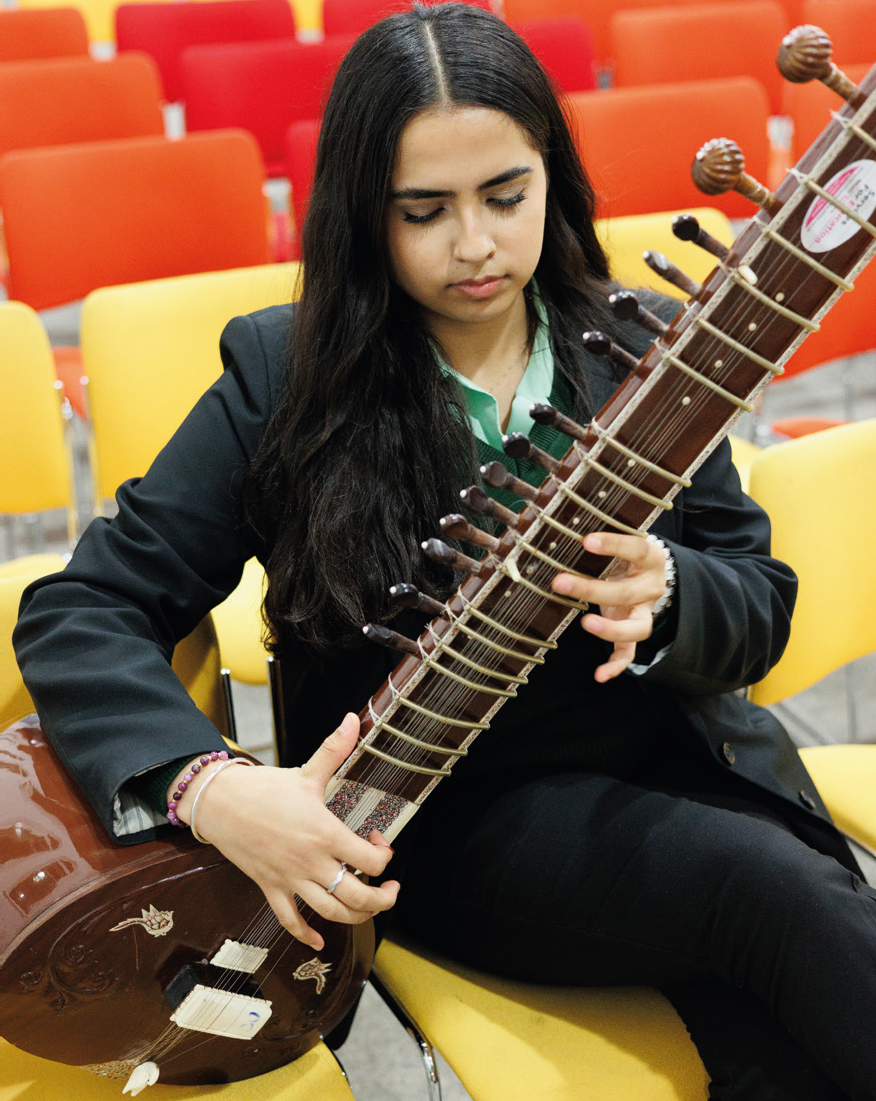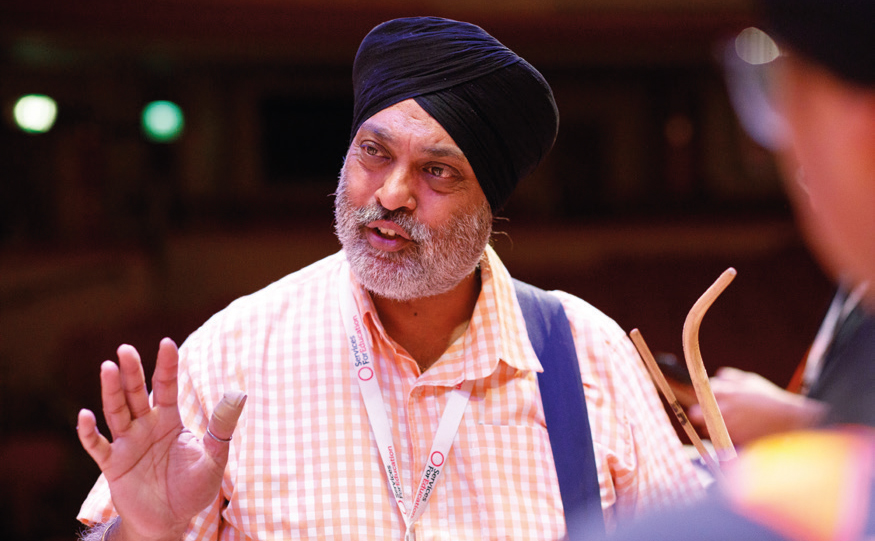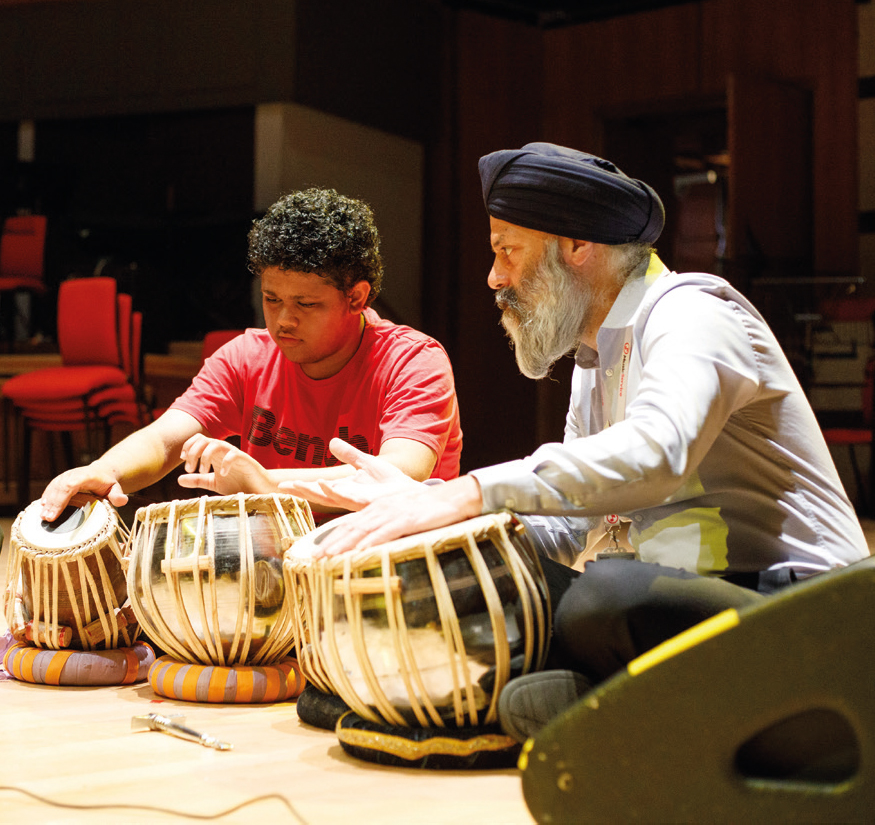
It is early Monday evening in Handsworth, Birmingham. Two groups of children are taking their places in a school music centre – a former Victorian Methodist church still boasting an organ and pulpit – having selected their instruments from a side room. There is no disputing the excitement and anticipation for the two lessons and rehearsals that lie ahead. A few students are already warming up.
Across the UK, many thousands will be doing the same – except the instruments these children are setting up would rarely feature in a western orchestra or ensemble. Instead, there are djembes from West Africa, samba drums from Africa and South America, sitars, tabla twin-hand drums and dhol double-headed drums from the Indian subcontinent, harmoniums from West Bengal, and steel pans from Trinidad and Tobago.
Delivering for Birmingham
Not so long ago, it was rare for such instruments to feature in Birmingham's music education; but in recent years, participation has risen significantly. Each week 3500 Birmingham children attend small group or one-to-one lessons on the djembe, tabla, sitar, steel pans or dhol (including folk drumming from Punjab). Almost one-in-five are from non-BAME backgrounds. In the last five years, there has been an explosion in demand for these lessons. Djembe is up 216 per cent, tabla up 311 per cent, steel pans up 563 per cent and dhol, a remarkable 768 per cent.
The impetus has come from Services For Education (SFE), the Birmingham charity that delivers Birmingham's music service – and whose school support service also works with 570 schools training teachers and support staff. Part-funded by Arts Council England and supported by private donations and trusts, SFE's 187 tutors teach music of all types and genres to nearly 32,000 city children each year, while also running 97 free ensembles – providing 27,000 instruments free-of-charge so all children can have access to playing and enjoying music together.
SFE's collection of African, Asian and Caribbean instruments, also available to Birmingham children on free loan, now totals nearly 3,400 and is believed to be the largest collection of its type in the UK.
It was in 1997 that Birmingham Music Service – now part of SFE following the charity's founding ten years ago when Birmingham City Council devolved some aspects of its work – established a department specialising in ‘world music’. Harjit Singh, SFE's head of world music and percussion, and director of Birmingham Schools' Azaad Dhol Group, joined the service in 1995, when such instruments in Birmingham schools were scarce. He and Stuart Birnie, now head of music service at SFE, laid the foundations of what they believe is now the UK's largest department with this focus.
Today, SFE employs 24 specialist tutors who work with 132 Birmingham schools, teaching groups or whole class (WCET) – so every child in a class can participate. ‘From the outset, our aim was to deliver world music to all children – no matter their ethnicity or background – so every child could experience the vibrancy and diversity of music and gain a better knowledge of different cultures and the influence of music worldwide’, says Harjit Singh. ‘The original focus was on Indian folk music from Punjab. We first approached schools in areas such as Handsworth where the population's ethnic mix was more appropriate, but it was not long before we became more universal – and mainstream. In consequence, through music, children in Birmingham have a better understanding of different cultures, traditions and heritages, and appreciate how music influences us all, no matter the colour of our skin or where we live.’
 Ela Aheer, a Year 10 student with Grade 3 sitar
Ela Aheer, a Year 10 student with Grade 3 sitar
Raising standards
Students have played at the Royal Albert Hall, at festivals, with Islamic community groups, in mosques and on the stage of Birmingham's Symphony Hall, the venue for SFE's annual five-night Birmingham Youth Proms. In the 2022 season they performed Indian and African works alongside the Birmingham Schools' Wind Orchestra and Band of Her Majesty's Royal Marines, Collingwood – as well as with Bollywood Brass Band, with whom SFE has established education partnerships.
SFE has also introduced accredited music exams in tabla, sitar, dhol and steel pan. The graded practical and theory exams are delivered in partnership with Pandit Ram Sahai Sangit Vidyalaya (PRSSV), a trust named after one of the most innovative Indian musicians of the 18th century. Since 2014, more than 150 children from Birmingham have achieved formal qualifications.
One of them is Ela Aheer, a Year 10 student from Queen Mary's Grammar School in neighbouring Walsall. Having started playing violin and clarinet, she took up the sitar seven years ago, achieving Grade 3 and now progressing to 4. She speaks enthusiastically about her music tuition that has resulted in her playing twice at Symphony Hall, albeit ‘it was a scary experience, especially in such a small group’.
‘The music teachers are really welcoming and very helpful. It's very friendly. It's why I'm still doing it’, she says, after her one-hour rehearsal.
Birnie is keen to share the knowledge gained establishing the department. ‘We have learned a lot by working in partnership with music groups and Birmingham schools, and have a better understanding of the benefits our teaching can bring to both education and the wider community. We have also created methods for teaching a range of instruments.’
- For steel pan, the department has developed a unique mini pan for teaching large groups from all age-ranges (especially in WCET), using a pan syllabus designed by the department's tutors.
- The creation of a mini dhol has enabled large group teaching of younger students. Dhol teaching includes traditional folk beats and classical and Sufi traditions. Working with PRSSV, the team has designed its own dhol syllabus.
- The djembe – one of the most popular drums – is combined with steel pans and dhol for WCET in schools.
- While tabla teaching in WCET and groups generally reflects the traditional style, some settings combine Western instruments, including keyboards, and experiment with cross-over styles and rhythms.
- Sitar is taught in small-group settings and follows the traditional way of learning, with notation and raags. An advanced ensemble has been created where the tabla accompanies the sitar for performances in concerts.
 Harjit Singh, SFE's head of world music and percussion, and director of Birmingham Schools' Azaad Dhol Group
Harjit Singh, SFE's head of world music and percussion, and director of Birmingham Schools' Azaad Dhol Group
Expanding the curriculum
The journey has not always been easy. Both Singh and Birnie initially experienced resistance to ‘yet another’ initiative impacting on the curriculum. ‘The teaching of music in schools has long followed traditional and sometimes rigid approaches’, says Singh. ‘Most of the head teachers we initially approached were not of Asian or African background. They didn't always appreciate the benefits we could bring or that instruments were available from the music service.’
‘We provided free workshops but there were still hurdles to cross in educating school leaders to understand that the communities the children were from would be interested in their children playing an instrument they associated with – either because they experienced it in the temple they attended or heard it in their homes.’
Is there, I ask Singh, a problem with the term ‘world music’? ‘When we first started, the term was widely used in music circles, especially to represent the music of Africa, Asia and the Caribbean,’ says Singh. ‘We used the description to cover the teaching of drumming (African and Indian) and steel pan. We identified it for instruments from non-Western cultures. Today, maybe the description ‘world music’ doesn't fit into a more global approach, but at the time that's how it was defined. It is not flawless, but there is a wide understanding within schools of what it represents.’
Increasing our understanding
The benefits that this music brings to children are what excites Birnie and Singh the most. ‘Music is universal. There is not a single culture in the world where music does not play a part. It is a shared language and even though styles differ across the globe, it can bridge cultural gaps and encourage harmony’, says Birnie.
‘Increasing understanding of both western and eastern approaches is important. Music is used worldwide to mark religious occasions, as a celebration and to represent artistic and human endeavour. Enabling children to appreciate the music of other cultures is an important part of education and goes beyond the creation and playing of music itself.’
Year 10 student Ajay Phull started playing dhol at the age of four, before also taking up drum-kit when in Year 3. He moves seamlessly between different genres and in rehearsal shows a natural flair.
‘The dhol was probably bigger than me when I started. Me and my brother had lessons and became part of a group. I enjoy all the instruments I play – dhol, drum-kit and guitar; I like making noise! I find the time to practise, and I find the time to play. All my teachers are great as well’, says Ajay, who attends King Edward VI Handsworth Grammar School for Boys and enjoys music of all genres: ‘It's good to have the mix’.
Birnie is confident that the popularity of these instruments will continue to grow – and that this will happen across the country. For the Birmingham area, ‘We will continue to reach as many children as possible and increase our partnerships with local communities. It is also important we continue to develop relationships with non-mainstream settings such as special schools, alternative provision and pupil referral units. We have a responsibility to ensure our staff are trained and supported to work across all areas of the education scene.
 Harjinder Matharu rehearsing with tabla students
Harjinder Matharu rehearsing with tabla students
The work of SFE has been recognised in several awards. These include the Asian Business Chamber of Commerce Annual Award 2022 for Outstanding Charity of the Year, for its development of a world music department and innovative Health for Life programme for promoting healthier family lifestyles. It was also winner in the arts, culture and heritage category of the 2022 Charity Awards and, in the 2021 Music & Drama Education Awards, was awarded Outstanding Music Education Resource for its online materials developed during the pandemic.








